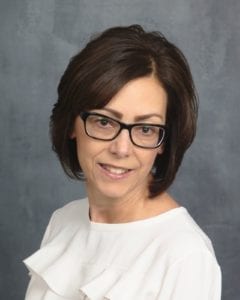 Mary serves as a data abstraction subject matter expert, ensuring data accuracy through quality control oversight, while keeping abreast of industry specific data collection rules and specification changes and providing ongoing education to her assigned data abstraction teams.
Mary serves as a data abstraction subject matter expert, ensuring data accuracy through quality control oversight, while keeping abreast of industry specific data collection rules and specification changes and providing ongoing education to her assigned data abstraction teams.
Prior to joining Registry Partners, Mary served as Certified Tumor Registrar for Upstate Medical University in Syracuse, NY for several years and also served as a study group leader, tutoring students in Human Anatomy and Physiology.
Mary earned her Bachelor’s Degree in Health Information Management/Health Services Management from SUNY Institute of Technology in Utica, NY and has her Registered Health Information Administrator (RHIA) certification as well as her Certified Tumor Registrar (CTR) certification. She is a member of the National Cancer Registrars Association, the New York Cancer Registrars Association and the American Health Information Management Association.
Mary resides in New York with her husband and they have four children. In her spare time she enjoys gardening, playing shuffleboard, antique shopping, watching football and attending music concerts.
Q & A with Mary:
Q: How did you become interested in the cancer registry profession?
A: I was first introduced to cancer registry while completing a specialty rotation course required for my bachelor’s degree in Health Information Management. During this time, my mother had been diagnosed with ovarian cancer and had already gone through surgery and multiple chemotherapy trials. I realized that cancer registry was the opportunity to not only gain a better understanding of cancer, but it would allow me to make an impact and contribution on the fight against cancer.
Q: Why do you believe clinical data registries are so important?
A: Clinical data registries collect crucial data that impacts the diagnosis and treatment of cancer. Data sets collected of demographics, cancer types, disease extent, treatment and outcomes are all vital in helping researchers and physicians provide better detection, prevention, resources and treatments to patients.
Q: How have you changed your work habits working in a remote environment?
A: Working in a remote environment has allowed me flexibility in how and when I work. I have incorporated the use of an adjustable desk in my home office that enables me to stand for periods of my work day. I am finding this has a lot of physical benefits for me. With the ability to change my work schedule to accommodate personal and family needs, I no longer always work a regimented schedule with conventional work hours. I now feel that having more control over my work schedule has afforded me a better work-life balance.





